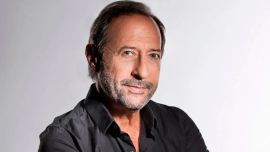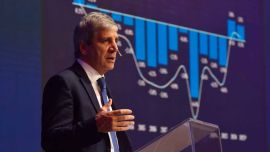Journalist and author Jorge Lanata comes from four months of intense physical suffering.
He was unable to leave his bed, limited only to staring at the ceiling. This “baby’s viewpoint,” as he calls it, has led him to new reflections, not only about the reality of Argentina, his country, but also about his own work.
Nearing 60, he affirms that his main wish is that his head permits him to die working – and that the only thing he does wrong is to carry on smoking.
Let’s divide this interview in three parts: your health, politics and – what interests us most – journalism.
OK.
POLITICS
Were you expecting Alberto Fernández’s PASO primary triumph or was it a surprise? I was expecting it but not with that difference. On the Friday before the voting I spoke to [expresident] Mauricio Macri and told him they could lose.
They thought they were only going to lose by a couple of points.
They made diabolically silly calculations that it was four minus one plus eight. It was ridiculous. The Macri government made millions of mistakes. There were also some successes. But yes, on the electoral issue they trapped themselves into an upbeat discourse between four people talking to each other in a lift.
Did you expect them to lose by a smaller difference, which could be turned around in the general election?
Not necessarily. I think that Macri dumped on his best candidate, who was [ex-Buenos Aires Province governor] María Eugenia Vidal. It’s impossible to make history that way. But everybody thinks that if Vidal had run instead of staying in Buenos Aires Province, she would have pulled off an upset. The most important factor behind Macri’s defeat was that he did not see what was going on.
Did Alberto Fernández’s triumph disappoint you?
Not because of Alberto Fernández. It worried me because Argentina has worried me all my life. It worries me that we’re always going back in time. If Cristina [Fernández de] Kirchner is vice-president, that to me is an error, something which should never have happened.
Was it Macri’s fault?
His in part because that transformed her into a rival and that kept her alive for a while. But otherwise it wasn’t Macri’s fault. Cristina is a brilliant politician, you’ve got to hand it to her. That Saturday, March 7, 2020 does not alter the fact that she is an unbalanced person. What she did with Alberto Fernández was genius because she knew she could not win alone and that Peronism, historically, always ends up uniting. What happened is what history said was going to happen.
Did Mauricio Macri disappoint you?
He’s not a political leader. I’ve always said it and also told him. He’s more a businessman. I say he’s not a leader because he’s not someone who dares to go against the opinion polls. Sometimes you need to go against what the people want in order to be able to do something you believe to be right. That’s leadership – looking ahead and seeing the best.
Opinion polls are always photos of the past.
Leaders see beyond other people. Macri never had that courage. He had a hunch and that’s why he won. With Elisa Carrió he made Cambiemos’ triumph possible because nobody thought that the Radicals could team up with PRO – perhaps a wing or a sector but never all the Radicals. He united them and that was what defined the triumph. Both Carrió and Macri instinctively saw that there was a sector of the population which was tired of corporatism, who wanted a freer life with less pressure from the State, who wanted those who worked hard to earn well and those who worked little to earn little.
A different system of rewards and punishments.
A different system of values and rewards and punishments. That is what Macri instinctively saw. That, plus the denunciations of corruption and some other issues, was what allowed him to win. But afterwards he was not consistent with that intuition. Within a short time he ended up sealing deals with the powers that be in Argentina, with the trade unions. He did not want to come to grips with the issues, he spoke of gradualism, not shock therapy. That is something which Alberto does understand now. When you take office, the clock starts ticking backwards. What you don’t do in the first 90 days, you’ll never do again. You start losing power, not gaining it.
The book which you are about to publish is entitled “Por qué no se pudo” (“Why it could not be”). How did that title originate, can you give us a back cover, so to speak?
That’s the question many people ask. But I don’t believe this Macri argument that they were moral champions. There are no moral champions and they lost the election. Nor do I believe that Cambiemos is really 41 percent of society but nor is it 20 percent. They gained the votes of those who hate Cristina and also the anti-Peronists. Now it’s up to them first to see if they can keep that 41 percent united, something very difficult, and then to see if they vote for them another time. Why did they lose? Because Macri is not a political leader, because he was too selfish when he decided in favour of himself instead of Vidal and because he didn’t listen. There were many things which Macri finally did which should have been done in the two previous years. For example, the call for consensus. You can’t apply austerity without the consent of those at the receiving-end, except in the context of dictatorship. To propose austerity, Macri should have sat down with everybody, including the Church, the CGT, the poorest and the richest and everybody involved. But he lacked the charisma or leadership to do something like that.
Neither did he believe it to be necessary.
He deeply mistrusted the Peronists. He had had a very bad experience with [lower house Speaker] Sergio Massa. He did well to mistrust businessmen because they spent all their lives asking for Macri and then dumped on him day after day. Nor did he have their support. Argentine businessmen are really weird characters.
Businessmen do not see Macri as a businessman like his father Franco. It also has something to do with generations. But does all the responsibility fall on Macri, does not society share some?
But politics moves at a different pace to the people, whose times are slower but also inexorable. When a people changes, it really changes. That’s why there will be no more dictatorships in Argentina. The last one cost 30,000 lives and wasted 10 years, it was a disaster but it convinced people that was not the way. We cannot continue thinking of Argentina over the next four years. The politician who is really going to change all this will do so thinking of the next 30. The challenge is whether we are ready to participate in something whose result we are not going to see. That happened at some stage in Argentina: Manuel Belgrano did not know what would happen within his lifetime and neither did Domingo Faustino Sarmiento. They were not persons from another country, they were Argentines but they were able to think like that.
You said: “In March, we’ll be worse off.” After 90 days of the Alberto Fernández administration, what balance would you draw?
The government is playing for high stakes at great risk. People close to Alberto Fernández told me the other day that he is happy because he does not end up having to deal with all the divisions within the government. A pity it should be that way. Government has ground to a halt waiting to see what happens with the debt. There’s no economic plan or at least no known plan for negotiating with the International Monetary Fund because the IMF will ask them what they’re going to do. Nothing is known as to what’s going to happen and the decay continues.
Would you believe me if I told you that they do have a plan but they’re not going to say what it is?
That seems stupid to me, café chitchat.
Is the dispute between Alberto and Cristina real or are they laughing at everybody behind their backs and are basically in agreement?
It’s for real. It’s not a question whether you believe it or not, the dispute with Cristina has accelerated much more than we all thought. It’s a contradiction with many aspects. For example, the debate about political prisoners. On this issue Cristina’s people in the government are whittling away Alberto’s power. It cannot be that a minister, or Sergio Berni, for example, publicly says something contrary to what the president says. There’s something unresolved there.
The non-existence of an economic plan also has partly something to do with that dispute. It is very difficult to make an economic plan between someone who wants to pay up on one side and a lady demanding a haircut on the other, to conciliate in an economic plan. Then you have a guy like Axel Kicillof, who is a student leader, a rare example of an anti-system personality embedded in the system. Somebody needs to tell him that he’s inside the system because he’s governor.
Do you see Alberto as up to managing the situation?
The other day I was told a private phrase of Alberto Fernández which I’ll pass onto you because it’s not so terrible. Alberto says: “I’m Cristina’s Rivotril tranquilizer.”
I don’t know how long that will last. It’s very complicated when the discussion over power transcends your own intimacy. And that’s happening with increasing frequency. It will be very difficult to push through the changes they wish to make in the justice system.
What they really want is to wipe out all the corruption court cases. Cristina doesn’t want a pardon because that would be a recognition of guilt, she wants a diploma. And that’s going to be difficult because there is plenty of evidence and they can’t just throw it in the garbage and burn it.
Who is the opposition leader today?
There is none. If you have their telephone number, give it to me, I want to publicise it. But there is none and that’s terrible. I’m not saying that nobody comments on what’s going on, several people do that. But there’s no leader.
Will the three parties of the Cambiemos coalition stay united in the future?
It’s going to be difficult. You have Radicals like [Senator] Martín Lousteau and [party chairman] Alfredo Cornejo on one side and [City Mayor] Horacio Rodríguez Larreta and María Eugenia Vidal on the other who might well even clash regarding Mauricio Macri, as well as between themselves. Because it would be legitimate to ask if the next presidential ticket should be Larreta/Vidal, or Vidal/ Larreta.
Vidal places Larreta as her leader.
Yes, and also Macri.
And she has shown discipline.
Yes, of course.
If the government is brittle and there is no opposition, how does this story continue?
Very hard to know. The risk is that the rift between Cristina and Alberto will be accentuated to the degree that the economic plan does not produce results, always supposing that a plan exists.
Would good economic results be that Rivotril tranquiliser?
If there were results, yes, They could both then cross their egos and Alberto might even be reelected.
That’s one of the scenarios.
But at least until now there’s no sign of a possible economic revival.
So, Scenario 1, if they achieved economic results, whether accidentally or not, Alberto would be re-elected.
Yes.
But if they don’t get the economy right, there would be an internal crisis in the government alliance.
In that case we’d also need to see what happens with Massa and who stays with him or whether he walks alone. Peronism can also break up with the same ease with which it unites. I don’t believe in Peronist unity because I talk to them and I know that they all hate each other. They don’t come to me to speak well of the others.
Then Scenario 2 would be: if the economy’s not working and if Alberto cannot be reelected, the opposition might emerge from the ranks of the government, for example, Sergio Massa.
Sergio Massa is by far the politician most similar to Néstor [Kirchner] in both the good and bad sense. He also has the most presidential aura. What happens is that Massa, for reasons which I do not know but his psychologist might, is self-destructive every time he is constructing. It’s already happened twice – he reached an important position and power which then crumbled away by itself. In that sense he’s like Lilita [Elisa Carrió].
JOURNALISM
In 2015, when everybody thought [ex-presidential candidate] Daniel Scioli was going to win, you thought of going to live abroad.
Yes.
But now with an even worse result, from your perspective, you’re staying put here. What has changed?
That’s not something directly linked to politics. It’s not that I was going to live abroad because one or the other won. It’s the other way round – this year I’m returning to television and if you ask me, I’d prefer to do another kind of programme, not a political one, something else. But I know I have to return to Periodismo Para Todos because Alberto and Cristina are in the government, I cannot not return.
You have said: “There’s a lot of complacency and a lack of criticism.”
There is a lot of complacency. Journalists are fascinated with Alberto as they were with Néstor in 2003. I think that’s an error.
To what do you attribute it?
We journalists are pretty snobbish brutes who are sometimes carried away by appearances although there are some exceptions. You know because it happened to you and me but nobody talks of things while they’re happening. Everybody is pretty complacent.
Ferdinand de Saussure said that it is the use of words which gives them their validity and meaning. How did you come to define the polarisation with the word “grieta”?
It comes from beforehand. A while ago I made a video for you which was called “La grieta,” in the name of the dictatorship.
True.
That night I was at the presentation of the Martín Fierro prizes and there it was manifest. The people were even physically divided.
I was standing and looking around the tables – some people were whistling disapproval and others applauding. I could not abstain from saying what I was seeing. It’s like the Charly García song: ‘Yo solo tengo esta pobre antena’ (“I only have this poor antenna”).
Sometimes our antennae tune in with ever ybody’s... there’s no rule for that. Sometimes you say things and nobody listens. Sometimes you talk and what you say lies buried for decades. I did not propose anything. I said what I felt at that moment.
In that instant the word acquired a new value.
You can see that it was well chosen, that it expressed what was going on. But neither is it such a particular word.
Do you feel you covered the four years of Macri the same way as Kirchnerism?
No, because it wasn’t Horacio Rodríguez Larreta counting money in the Rosadita. The facts were not the same so they shouldn’t be covered in the same way.
I aired the irregularities in the Macri government. I denounced [Deputy Cabinet Chief] Mario Quintana at the time and he ended up having to go over Farmacity. When we had information, we informed. But of course, it was not the same thing, the corruption was completely different. Some petty corruption is emerging now like the US$10,000 [in the Production Ministry] but I didn’t see any money trail in the Macri period or anything of the kind.
Could you make any self-criticism about what was genuinely militant journalism in the last years of Kirchnerism?
I entered [Grupo] Clarín after fighting all my life against Clarín because I competed with it. You know as well as I do that Clarín is a very hostile competitor. When you’re on the other side, they fight hard, to put it mildly.
I also have to say, to be fair, that Clarín had less prejudices against me than I had against them. When I entered Clarín, the general tone was militant journalism. What a laugh because that’s my life: fighting against the major dailies, against everybody, against the companies who don’t contribute. For me it was fun while they lived in anguish. That was for a spell but it didn’t last long, afterwards it became more balanced.
I don’t think they’re into militant journalism today. What happened to Clarín then is what happens to the neighbourhood bully when a jab from a tiny tot touches a sensitive nerve. There was a moment of confusion in which they did not understand what was happening.
Did Mauricio Macri receive preferential treatment from the major media?
The same as Alberto does now due to the fascination about which I spoke to you earlier.
But he’s only had 90 days. Will they continue treating him like that over four years?
Perhaps for a year or 18 months.
The benevolence towards Mauricio Macri lasted longer.
If La Nación supports Macri, that does not seem strange or illogical because La Nación does not think differently. Clarín thinks a bit differently to Macri in some things but not in others and, well, they backed him. Which does not seem to me either good or bad but how it is.
Will the time come when Alberto Fernández will have to choose between Cristina Kirchner and Clarín?
He’s always going to choose Cristina Kirchner. That’s not an option for him.
Is it true that before your health problems, you were about to make a documentary with Netflix about Kirchnerite corruption similar to the one on Lava Jato made for Brazil?
What I was making was a documentary on the money trail and I did indeed finish the script but I never said it was going to be with Netflix. I presented it at a meeting in which there were cable television providers. I did a trailer which I presented but I have neither filmed nor started to film it.
In Brazil they say that the Netflix Lava Jato series El mecanismo, equivalent to “La ruta del dinero K” here, was central in Jair Bolsonaro’s triumph and the defeat of the PT [Workers’ Party]. If you hadn’t fallen sick but had finished that documentary, might it have modified the electoral result somewhat?
That would be a very presumptuous affirmation. The media are important but not that important. The whole issue is overrated.
Don’t you think you were fundamental in Macri’s triumph in 2015?
The protagonists were those who robbed and we just found them out. But I cannot ask myself about the timing of what I do because there are elections all the time here. I’d have to lock myself up every two years.
Could we add some television to the menu of the future Lanata even if it is not the classical journalistic programme?
We may but I’ll still tell you that I want to try and work a bit less.
Will you be able to?
Yes, instead of 24 hours a day, 18. I’m almost 60. You get tired with aches and pains.
So you could never stop working.
I hope to die working as a talking head. Because that’s what I am.
Jorge Lanata on his health
You turn 60 this year.
Good heavens.
Has your relationship with time changed?
I loved being young and controversial, which I am no longer..
We all stop being young.
We do indeed ... It seems to me that I’m the only one getting older, that everybody else is young. I don’t know if I’m going to turn 60. At times I feel 12, at others 124.
Or 300, like the vampires.
It depends on the time of day. Such a strange feeling. As the years go by, you feel better than before. I hope that’s so.
You feel more intelligent, more understanding. Wiser?
That’s such a strong word, “wise,” but I guess so.
Do you understand other people better?
You understand other people better and you understand yourself better. You understand better because things have happened. The clock also begins to run backwards. You begin to see life as a whole bunch of opportunities but as something which ends.
A finite relationship different from that at 40.
You cease being immortal at 40 although you think you’re going to live forever until that age. Afterwards you realise not. Friends start dying around you, some of them young. [Journalist] Marcelo Zlotogwiazda has died, many people. That too has its effect.
Does your relationship with your body change?
I’ve always paid more attention to my head than to my body. Amid all my difficulties, as long as my head continues to work, the rest doesn’t bother me.
You had a serious fall.
I’m Terminator. I’ve seen it all. Last year was terrible because I had three falls. The last of them was the worst, at the entrance of the radio station. I fell completely on my back. Nothing like that had ever happened to me before. It was very nasty.
You’ll carry on here and won’t go to the radio for another month, for example?
I’ll carry on here for a while, yes.
You work tirelessly, four hours of radio, and you’re going to do your own programme on Channel 13 plus some documentaries. You have a book pending. How many hours do you work a day?
I don’t see it as work, I just like doing what I do.
How many hours do you dedicate to producing?
—All the time. Even when you’re watching a useless series, some part of you is producing. You watch and say at a determined moment: “Look what good camerawork.”
Is being a journalist a state of mind?
I’m from Sarandí, which is the poor part of Avellaneda. Being a journalist is a way of entering the world. In a building like this, I would have been sent to the tradesman’s entrance. But being a journalist I entered the world, travelled and saw places and people I’d never have known. It was a lifestyle.
Journalism is existential.
I think so.
If you have no economic need to work, you still wouldn’t be able not to work.
I couldn’t stop writing. I’ve been doing it since I was 12. I don’t write to publish. There’s a whole bunch of stuff I’ll never publish, because it’s rotten or because I don’t feel like it or because it’s too intimate or for whatever reason. For the world I’m a person who writes, that’s how I define myself. It doesn’t bother me, it’s not a burden.




















Comments